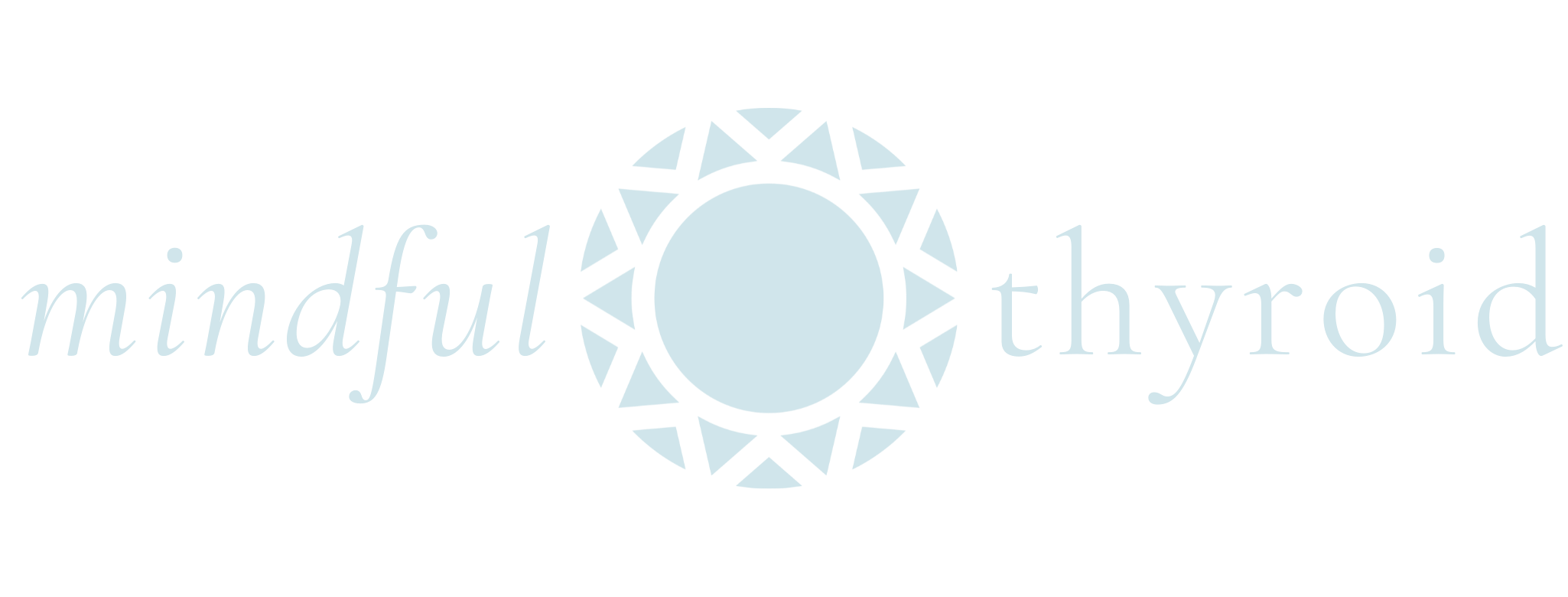Are you newly diagnosed with Hashimoto's Autoimmune Thyroid condition?
I'll break it all down for you in an easy to understand way.
Hashimoto’s is an autoimmune thyroid disorder where the immune system attacks the thyroid peroxidase (TPO) enzyme that’s needed to make T4 thyroid hormone. This can lead to reduced thyroid hormone output with hypothyroid symptoms, such as, fatigue, weight gain, feeling cold, brain fog, low energy, depression/anxiety, panic attacks, hair loss, dry skin, joint pains, constipation and digestive issues. You may also experience inflammation, swelling and possibly nodules in the neck or thyroid area due to inflammation from the autoimmune attack.
Testing for TPO antibodies can diagnose Hashimoto’s – a level over 35 indicates autoimmunity. In the earlier stages of Hashimoto’s, it’s common to swing from hyperthyroid symptoms to hypothyroid symptoms until you eventually just feel tired and sluggish all the time and become hypothyroid (you may still even show in normal range on a TSH test). This means you might swing from periods of high energy, weight loss, anxiety/panic attacks or palpitations to periods of fatigue, weight gain, depression and constipation that can last several months at a time.
Hashimoto's Is More Than A Thyroid Issue
Your adrenals, blood sugar / sex hormones and gut health are involved. Autoimmunity occurs when three factors are present:
- Poor gut health (leaky gut)
- Genetic predisposition
- Triggering factor(s) like stress, viruses, nutrient deficiencies and toxin overload

What Lab Tests Do I Need?
I recommend asking your doctor for a full thyroid panel, not just the TSH (thyroid stimulating hormone) test. At the very least request TSH, Free T4, Free T3 and TPO antibodies every time you test to keep consistent data for tracking your levels and dosages (if on medication).
Free T4 hormone is unbound in the blood making it available for the body to use or convert to T3, the active thyroid hormone. Free T3 is the active thyroid hormone in the body that’s unbound and available for uptake by your cells. TPO antibodies greater than 35 (on most lab ranges) are indicative of Hashimoto’s autoimmune disease and is helpful for diagnosing Hashimoto’s. It can also be used as a guide to see if your lifestyle & diet changes are reducing the autoimmune attack on the thyroid.
If you want to test at home, I recommend using Paloma Health Thyroid Test Kit - click the link for a $30 discount off your first test!
Why Do I Feel Hypothyroid When My Lab Tests Are Normal?
Most doctors will only test for TSH, which is the hormone from the Pituitary gland that tells the thyroid to create T4 thyroid hormone. It doesn’t tell you how much thyroid hormone is circulating in your body and if you’re even able to get it into your cells for use. Always ask for a full thyroid panel to get more detailed data. You can be hypothyroid even if the TSH test shows in range if you’re not absorbing or getting thyroid hormone in the cells.
Factors that contribute to thyroid hormone not getting converted properly to T3 and/or used by the cells include:
- Blood sugar imbalances
- Poor diet
- High cortisol levels
- Birth control pills
- Infections and immune stress
- Nutrient deficiencies
- Candida overgrowth
- SIBO and other gut bacteria imbalances
Additionally, there are many other diseases, nutrient deficiencies and gut imbalances that are very similar to thyroid imbalances and may be affecting you, rather than thyroid levels. Testing for the full thyroid panel can help rule that out if it’s all normal so that you can look at other underlying issues that may be occurring. You may have to work with a Functional Medicine Doctor or Naturopathic Doctor to obtain further testing and uncover root cause issues.

Can I Put Hashimoto's In Remission?
You can reduce and even eliminate symptoms of Hashimoto’s and reduce your TPO antibodies level through nutrition, lifestyle and medication (if needed). Remission is a bit misleading of a term because your body will always have the antibodies it created towards the thyroid, meaning you can’t eliminate that factor once your body has already created the TPO antibodies. However, you can reduce the antibodies and even possibly eliminate them.
I like to think of it as “Well Managed” Hashimoto’s. By doing lifestyle interventions, getting enough nutrition and bringing your body back into balance you are able to effectively manage the Hashimoto’s disease so that you don’t have symptoms anymore. However, you still have the genetic predisposition for it and the antibodies (even if not active) that your immune system has designated towards the thyroid. If you were to go back to a lifestyle that increases inflammation and/or have certain viruses or other triggering immune issues occur in the future, you can see antibody levels go up (even if not as much as before).
I’d much rather have clients focus on creating a balanced lifestyle that helps you feel great, reduces symptoms and allows you to build sustainable lifestyle choices. You might very well get within a normal TPO range, or you might still be out of range but feel amazing! Use that lab test as a helpful guide to make sure nutrition and lifestyle choices are getting you in the right direction. Pay attention to how you feel and if the changes you’re making are sustainable for you long term.
What Type Of Medications Are Available For Hashimoto's?
There are synthetic (lab created) and natural dessicated (from porcine) thyroid hormone medications. Most synthetic hormones only contain T4 and not T3. However, you can take a synthetic T4 and a separate synthetic T3 if needed. Natural dessicated thyroid (NDT) hormones contain T4 and T3 in combination so some people may feel better on them than with T4 alone. However, NDT hormones can be too similar to our own thyroid hormone and can still cause an autoimmune attack by the body making some people feel worse on them. You’ll need to experiment and work with your thyroid doctor to find a medication that you tolerate well.
You'll most likely need to have lab tests done every 8 weeks when starting a new dosage or making dosage changes. It can take that long for the body to register the change and to have an accurate view of how your body is responding to the medication on the lab test. After that, you'll test every 6 months or at least once per year if your symptoms are managed.
It’s not an easy transition from synthetic to NDT or vice versa as the dosages are not the same. So it's best to pick one and stick with it unless you're really not feeling well on that type of medication. If you’re going from synthetic to NDT you’ll most likely start at a lower dose and need to work your way up as it will potentially feel more effective with the addition of T3. This may cause some unpleasant symptoms during transition until you find your optimal dosage.
No matter which one you choose, always opt for the brand name instead of a generic counterpart to get a more effective and consistent dosage. I also recommend using a weekly pill case to put your pills in so you can visually see whether you took them or not.

You Can Feel Like You Again!
Medication isn't always needed, especially if you are diagnosed early enough before too much thyroid destruction has occurred and you make lifestyle interventions. By bringing the body back into balance with an anti-inflammatory, nutrient dense diet, exercise, mindfulness and stress reduction, you can lower the autoimmune attack, reduce symptoms and some people may be able to reduce or avoid medication. Each person’s experience is unique and medication may be helpful while also making lifestyle changes.
You are in control of how you want to feel. To learn more about thyroid tests, labs and how to work with your doctor to get the best results, check out my Empowered Thyroid Patient Guide!
Sources:
AACE Clinical Practice Guidelines For Hypothyroidism
Related Blogs:
Lifestyle Interventions for Hashimoto's Autoimmune Thyroiditis

Kristina Cegla, INHC
Certified Integrative Nutrition Health Coach

